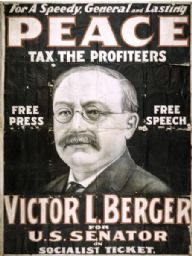Berger, Victor Louis [Luitpold] 1860 - 1929

Socialist, newspaperman, Congressman, b. Nieder-Rehbach, Austria-Hungary. He attended private and public schools and universities in Vienna and Budapest. In 1878 he migrated to the U.S., learned English in New York, and about 1881 settled in Milwaukee where he taught German. In the 1880's he became interested in social reform, becoming first a "single tax" advocate and then a socialist. In 1889, with like-minded German socialists, he abandoned the radical, doctrinaire Marxism of Daniel De Leon and the Socialist Labor. party in favor of a more gradual and flexible approach, and determined to work through the existing political structure to obtain socialist ends. In 1893 he became editor of the Wisconsin Vorwaerts, a Milwaukee German-language daily and later weekly, and held this position until about 1904. He was also editor of the English-language Social Democratic Herald (1901-1902). During the 1890's, he cooperated with the Populist movement until alienated by their endorsement of Democrat William Jennings Bryan for president in 1896. Berger was instrumental in influencing Eugene V. Debs to declare for socialism and in 1897 aided him in forming the Social Democracy of America. In 1898 the organization split over the question of utopian or model socialism (the colonization plan) as opposed to political action. Debs had become disillusioned with colonization and, when the political-action group was outvoted, he joined Berger's adherents in forming the Social Democratic party. In 1901 this group combined with the Rochester faction of the Socialist Labor party to form the Socialist party. Except for brief interludes, Berger was a member of the party's executive committee until his death, and was its national chairman (1927-1929). As the leading Socialist in Wisconsin, he shaped the Milwaukee group into a disciplined party organization, and by 1900 had won and consolidated local trade-union support. The party's initial election successes came in 1904, and in 1910 it gained control of Milwaukee city and county government and Berger was the first Socialist representative to be elected to Congress (serving 1911- 1913). In 1912 he was defeated for re-election by a Milwaukee fusion ticket. Meanwhile, Berger had added an English-language daily to the Milwaukee Socialist press, the Milwaukee Leader, and was its editor (1911-1929). With the outbreak of war in Europe, Berger grew increasingly concerned with the problem of U.S. neutrality. When the U.S. declared war (Apr. 6, 1917), he approved the Socialist party's St. Louis platform condemning American action and urged resistance to war. In October the government retaliated by revoking the second- class mailing privileges of the Leader, and in Feb., 1918, Berger and four other Socialists were indicted for conspiracy to violate the Espionage Act. While still under indictment in Nov., 1918, Berger was elected to Congress but was denied his seat by the House. In Jan., 1919, he was convicted on the espionage charge and sentenced to 20 years in prison. Re-elected in a special election held in Dec., 1919, he was again denied his seat. In 1921 the U.S. Supreme court upset his conviction on a technicality and charges were dropped. He was again elected to Congress in 1922, and served from 1923 to 1929. In the House, Berger advocated repeal of the Espionage Act and prohibition, and was interested in foreign affairs and reconstruction. Following his defeat for re-election in 1928, he returned to Milwaukee (1929) with hopes of rebuilding party strength, but was killed in an accident a few months later. A voracious reader and student of socialism, Berger was a lucid and persuasive editorial writer, but a mediocre speaker. Shrewd and capable, he was the spiritual leader of Milwaukee socialism, but was egotistical and domineering. His wife, META SCHLICHTING BERGER, b. Milwaukee, whom Berger married in 1897, shared her husband's interests. She attended Milwaukee normal school, was a member of the Milwaukee school board (1909-1939), and the state board of education (1917-1919). She was a normal school regent (1927-1928) and a university regent (1928-1934). A vigorous champion of woman suffrage, during and after World War I she devoted her interests to keeping the U.S. at peace. She succeeded to her husband's seat on the executive committee of the Socialist party but disagreements over Soviet Russia, united-front activities, and war policy led to a rupture in 1936, and her resignation in 1940. Dict. Amer. Biog.; M. Wachman, Hist. of Social-Democratic Party of Milwaukee (Urbana, 1945); Milwaukee Leader, Aug. 7, 1930; Voice and Pen of V. L. Berger (Milwaukee, 1929); V. L. Berger Papers in Milwaukee Co. Hist. Soc.; Milwaukee Journal, June 17, 1944.
The Wisconsin Historical Society has manuscripts related to this topic. See the catalog description of the Victor L. Berger Papers for details.
View pictures related to socialism at Wisconsin Historical Images.
View related articles at Wisconsin Magazine of History Archives.
View newspaper clippings at Wisconsin Local History and Biography Articles.
Learn More
Dictionary of Wisconsin History
Explore more than 1,600 people, places and events in Wisconsin history.
[Source: Dictionary of Wisconsin biography]
